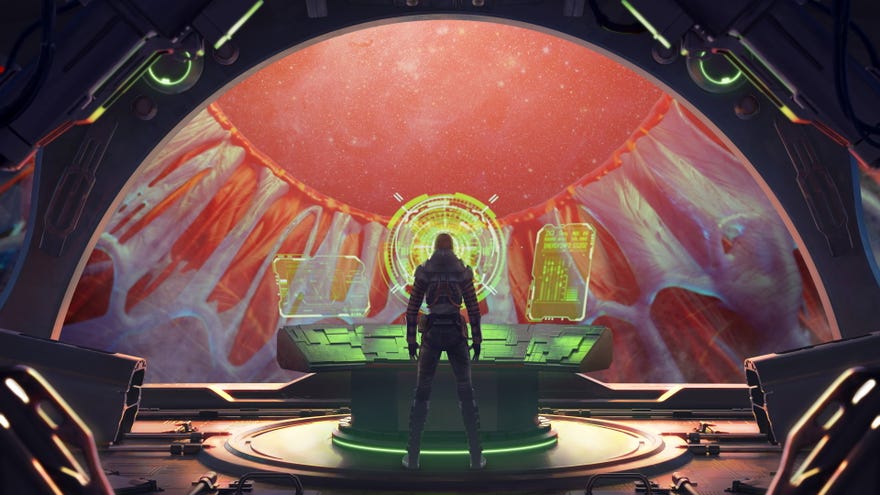Out There's sequel isn't a roguelike anymore, but it's "much more approachable"
We chat with the game's creative director about Oceans Of Time's switch in genre and new exploration tools
Out There has been described as everything from a "pacifistic take on FTL" to "Gravity without the chain of astonishing coincidences" in the halls of this parish. Having originally begun life on mobile devices back in 2013, this combat-free space exploration and resource management game arrived on PC two years later as part of a snazzed up Ω Edition, putting you in the shoes of a lone astronaut trying to survive on the fringes of deep space. It was also bloody difficult, with a punishing brutality lying beneath its serene and comforting surface - something that developer Mi-Clos Studio's founder and creative director Michaël Peiffert has been keen to address with its upcoming sequel, Out There: Oceans Of Time.
It's a "much more approachable game," he tells me, and having played a preview build of the first few hours earlier this week, I can tell you he's definitely on the money about that. For one, you're no longer alone in this big wide universe. You play as Commander Nyx in this latest adventure, a character from Out There's interactive graphic novel spin-off Out There: Chronicles. She's accompanied by her right-hand engineer Sergei (and eventually several other crew members) as they pursue the monstrous, wolf-like alien Archon across the galaxy. Archon's been plotting a bit of world domination, you see, and it's up to Nyx and co to capture him after a botched transport mission ended up setting him free.
To do this, you'll travel from star system to star system, mining resources from nearby planets to keep your ship going, and picking up clues on where to head next. This part will feel instantly familiar to Out There stalwarts, albeit perhaps without the crushing and often overwhelming need to prioritise fuel above everything else. Interstellar travel uses far fewer resources this time round, making it that bit easier to explore off the beaten path. For Peiffert and his team, however, it's been anything but a smooth ride.
"At first, I wanted to mix the sense of wonder and exploration of Out There, but also a character-based story like Chronicles," he says. "It required quite a lot of iteration to get the balance right. For a while, the game was both a roguelike and an RPG but wasn’t any of them either. At some point, it was clear we had to make a drastic choice. As the characters develop relationships and make meaningful choices in the story, we had to accept we were working on an RPG, not a roguelike. From there, we tweaked the difficulty and the pacing accordingly."
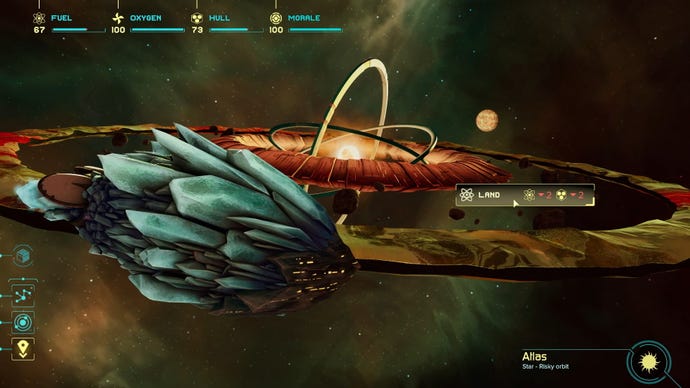
For Peiffert, it's not just this change in genre that makes Oceans Of Time by far his "most ambitious game to date". He and his team have also left behind the original's stylish 2D artwork for full 3D character models, and reinforced its planet-hopping core with a more robust narrative and overarching purpose. Indeed, you and your ship are no longer confined to simply hovering above a star's colourful surface anymore. You'll also be able to touch down on every hunk of rock you encounter, and if the conditions are right, saunter out for an expedition on foot. The latter is something Peiffert has always wanted to include in Out There, but never quite had the bandwidth to make it happen.
"Being able to explore those barren planets, overcome environmental hazards and discover mesmerizing secrets was a natural evolution to the series."
"Expeditions was the new feature I wanted to add since the inception of the project," he says. "Historically a pacifist franchise, Out There is about fighting against the most hostile environment to living beings: space. Being able to explore those barren planets, overcome environmental hazards and discover mesmerizing secrets was a natural evolution to the series. Our artists did a great job to make the weirdest biomes that look both amazing and threatening. That’s what exploring space is about."
These exploration section don't give you completely free rein, mind. When you and your crew do venture out beyond the borders of your ship, the ground beneath your feet transforms into a grid of clickable hexagons viewed from above, with the borders of your vision clouded by a thick fog of war. Probing the edges of what you can see will open the map up further, although in my preview I was often hemmed in by tall corridors of red, rose petal-like mushroom plants. Still, within these fungal funnels there was plenty to take in: story events regularly popped up with decisions to make and action points to spend; there were resources to plunder; life-sapping poison patches to skirt round; and points of interest to discover, all while making sure my crew's individual health bars didn't fall too low.
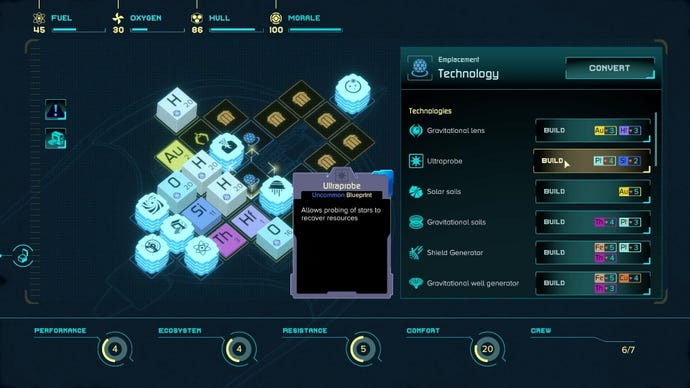
It was all relatively gentle stuff I saw in these early hours, although Peiffert tells me these expedition sections could have been a lot more gruelling in earlier iterations. "Very early in the inception, I wanted to add diseases that your crew members would catch when exploring alien biomes," he says. "Those diseases would then spread around to other crew members in the spaceship. You would have to deal with the outbreak by creating cures with alien plants (which are still in the game but for other purposes) or by jettisoning contagious crew members. That idea sprung in 2019, before the Covid-19 pandemic. We eventually cut it out as it wasn’t really helping the design overall."
I didn't have a chance to try it out during my preview build, but Out There: Oceans Of Time will also see players engage in diplomacy and negotiating with other alien races to help you track down Archon, a trait that may be familiar to players of Mi-Clos' most recent game, Sigma Theory: Global Cold War. While not set in space, Sigma Theory is a turn-based futuristic war sim that sees you take control of a spy network to win the emerging tech race. When I asked Peiffert if Sigma Theory helped to inform Out There's diplomatic elements, he said that it wasn't so much the game he drew inspiration from as the people around him.
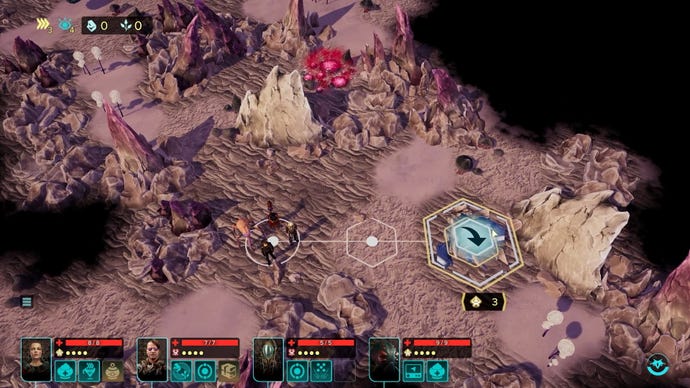
"If you look at all the games I’ve made, you’ll see that they reflect my own conditions through the years as a game developer," he says. "During the development of Out There, I was working remotely, completely isolated and with very little resources to buy food and pay the rent. Then I had to recruit and manage talented people around the world to work as a team on a bigger project – my A-team. That was Sigma Theory. Finally, Oceans Of Time, our most ambitious game to date, required me to hire a full team that would gather around and stick together on a collective goal. That’s exactly how you would manage the crew of a spaceship. All on the same boat.
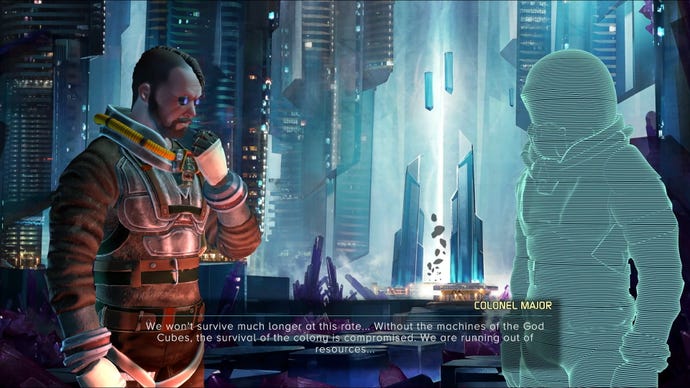
"I’m naturally an introvert. But my journey as a game developer taught me a lot about human relationships and interaction and how beautiful and harsh it can be. And I think I’ve, unintentionally, included those lessons in my games."
Those experiences have also allowed Peiffert to finally make an Out There game that was PC first, rather than being built for smartphones.
"If Out There came out on mobile first, it was an accident," he says. "I always wanted to make PC games from the get-go. But, at the time, my limited skills only allowed me to develop on a very simple game engine (called Corona SDK – RIP) that would only work for mobiles. Eventually, that technical limitation turned out pretty well as it was a huge success on mobile. But the little kid in me still wanted to make PC games, where I come from as a gamer. When free to play became the norm, I decided it was time to move on PC… and hire a proper programmer. Then we made a buffed-up version of Out There for PC (Ω Edition) and I’ve never looked back since. Except for Out There: Chronicles. But who knows, Chronicles might come to PC someday."
Indeed, Peiffert is far from being done with Out There. "I think I could work on this universe until my old days," he says as a parting note. "It’s always a pleasure to come back to it, as it is a unique and personal take on the sci-fi genre. I’m really excited to keep exploring the expansive lore we’ve developed in any form or media. The fact that I can simply ask myself, 'how could we make Out There bigger?' is such a privileged position, I’m cheering it as much as I can."
As for Commander Nyx and her quest to capture the tentacled Archon, we won't have to wait long before we can scour the galaxy for him ourselves, as Out There: Oceans Of Time is due to land on Steam on April 7th.
